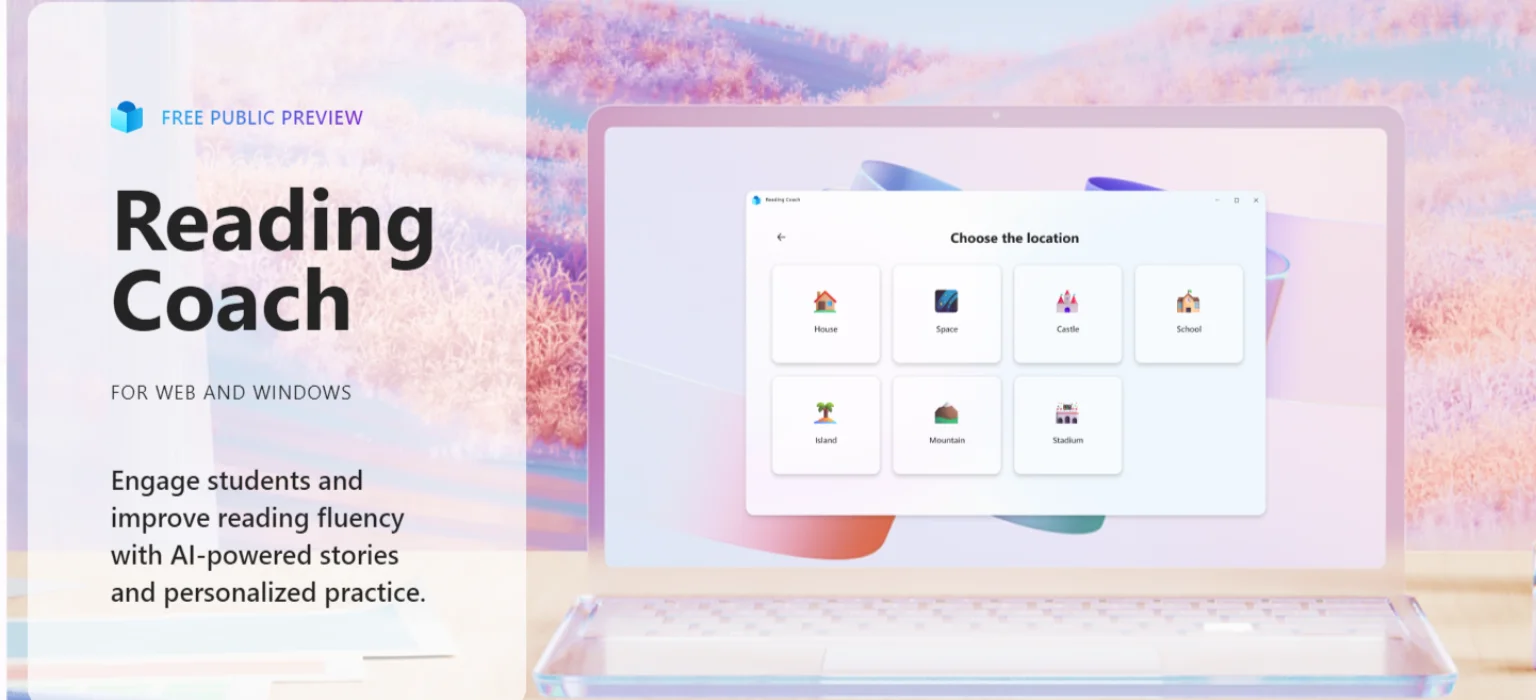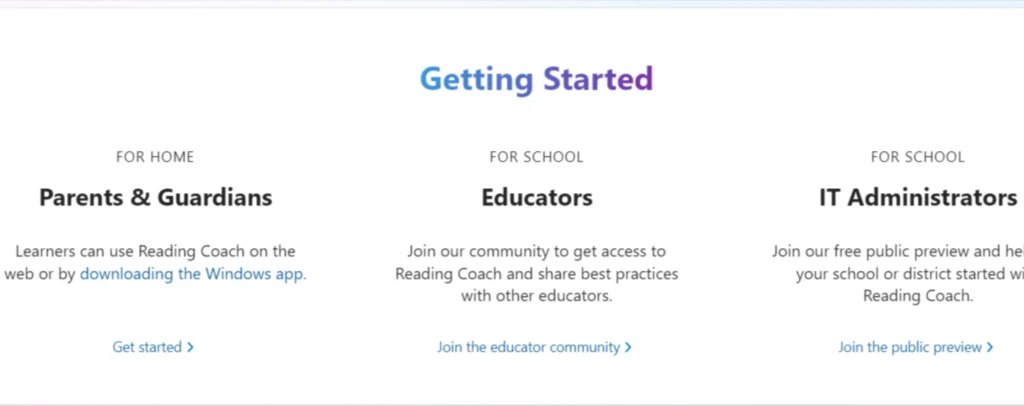
Microsoft has been making waves with a series of AI announcements in 2024, including the launch of Copilot Pro, the rebranding of DALL-E as Designer, and expanding access to many of its AI offerings. The latest in Microsoft’s AI push is an upgrade to its free Reading Coach literacy tool that now leverages generative AI to provide personalized and engaging reading experiences for students.
A Reading Tutor That Adapts To Each Student
The new Reading Coach allows students to choose characters, genres, settings and reading levels to generate custom stories tailored to their individual needs and interests. As students read the AI-generated stories aloud, the microphone picks up their voice to provide real-time feedback on pronunciation and trouble words.
Students can also alter the progression of the story by selecting different narrative options as they read to create a unique “choose your own adventure” experience. The goal is to make reading fun while also improving literacy skills.
Guardrails In Place To Ensure Age-Appropriate Content

As with any generative AI application, there is a risk of generating toxic or inappropriate content which would be concerning for a learning tool aimed at children. To moderate this, Microsoft has implemented strict guardrails to filter the stories for quality, safety and age-appropriateness.
The company utilizes a combination of automated filters and human reviews to ensure only student-friendly narratives are created. There is also post-generation moderation to remove any pieces of concerning content that may slip through.
Gamification Elements To Motivate Young Readers
To inspire students to use Reading Coach more, Microsoft has incorporated gaming elements into the experience. As pupils read AI-generated stories, they can unlock new settings, characters and badges to motivate sustained engagement over time.
There is also an achievement page that displays progress badges and other gamification features to track advancement. Making reading feel more like a game encourages students to continue honing their skills.
Accessible To All Reading Levels
A major benefit of leveraging AI for literacy education is the ability to personalize for any reading level. Students can choose exactly the right degree of complexity to suit their abilities. Beginning readers can select simpler words and sentence structures while more advanced readers can be challenged with more complex narratives.
The tool provides real-time pronunciation guidance and highlights vocabulary the system detects a particular student struggling with. This level of personalization is difficult for human teachers to match for every individual student. AI tutoring can fill essential gaps.
Enhances Human Teaching Rather Than Replacing It
While AI-generated reading experiences reduce barriers to literacy education, the intention is not to replace human teachers. Rather, tools like Reading Coach remove rote tasks from educators’ plates so they can focus on higher value instruction. Teachers gain more capacity to teach critical thinking and comprehension.
The automated tutor also provides teachers with data insights into each pupil’s reading proficiency. Analyzing AI-generated stories paired with student reading metrics offers a trove of actionable data to enhance human-led teaching.
Why Literacy Matters
Reading proficiency is highly correlated with overall academic success. Students who reach reading milestones by third grade are far more likely to graduate high school and achieve positive economic outcomes. Yet only 35% of fourth grade students in the U.S. are reading at or above grade level, indicating vast room for progress.
There are also significant literacy gaps along socioeconomic and racial lines in the U.S. education system. Black and Hispanic pupils in particular tend to score lower on standardized reading tests. AI-powered tools aim to help close some of these systemic gaps.
Nuances To Consider Around AI and Children
AI literacy tutors clearly offer tangible benefits, but thoughtful implementation matters. There are open questions on how much generative AI young children should interact with and for what purposes. Moderation will be critical.
Research also suggests AI storytelling should enhance but not dominate childhood reading experiences. Striking the right balance allows helpful aspects like personalization while preserving vital human connection. Ongoing analysis of outcomes will reveal best applications.
Global Implications Of AI-Powered Literacy
In regions struggling with educational access like Sub-Saharan Africa and rural India, AI tutors could be transformative. They reduce barriers commonly linked to limited public resources and geographical divides. User interfaces can also be designed accessibly across languages.
However, worthy debate remains on if priorities should focus first on foundational needs like school infrastructure, teaching resources and language access before AI. Reasonable minds can disagree on best paths forward weighed against economic realities.
There is incredible potential for AI tools to elevate youth literacy globally, yet approaches should align thoughtfully with cultural norms. One-size-fits all strategies may falter. Community-centric frameworks tailored locally show greater promise for scalable, ethical progress.
Microsoft’s Focus On AI For Social Good
The augmentation of Microsoft’s Reading Coach aligns with its stated principles on developing AI for positive societal outcomes. Fostering youth literacy and education broadly is a prime example of steering innovative technologies towards humanitarian objectives.
Yet utmost care must be taken, even with benevolent intentions, given AI’s capacity to inadvertently cause harm. Microsoft pledging to uphold strict content guardrails indicates an understanding of duties involved in building AI for young audiences.
The ultimate success will be measured in reading proficiency metrics over time across student populations. Real-world impact must supersede good PR. Microsoft does appear sincerely invested in meaningful progress through Reading Coach and parallel initiatives like AIForAccessibility.
If executed conscientiously, AI-generated learning tools could drive radical progress in global literacy rates. This assumption remains hypotheses today but shows promising indicators. The years ahead will reveal efficacies as programs expand across regions, cultures and more age groups. Literacy may stand among AI’s most life-changing near term potential.
Try Microsoft’s Reading Coach For Yourself
Educators, parents and anyone curious about the future of AI in education can preview Microsoft’s new Reading Coach capabilities today at coach.microsoft.com. I gave it a test run myself and was impressed to witness firsthand how engaging and personalized the experience can be.
With thoughtful safeguarding, generative AI appears poised to make reading breakthroughs for young students previously hindered by systemic barriers. But optimism must be balanced by patient analysis of outcomes over an extended time horizon.
If realized judiciously, a world where AI eradicates illiteracy generationally could drive compounding gains for millions globally. That aspirational scenario fuels Microsoft’s investments but relies on deliberate, compassionate engineering above all.
Read More :-
